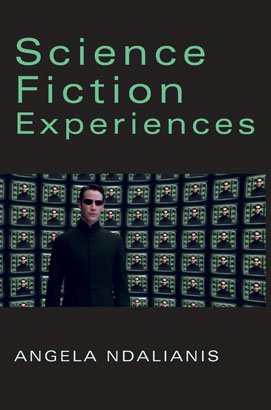
About the Author
Angela Ndalianis is Associate Professor in Cinema Studies at the University of Melbourne. Her publicatons include Neo-Baroque Aesthetics and Contemporary Entertainment (MIT Press 2004), the anthology The Contemporary Comic Book Superhero and the co-edited books Super/Heroes: from Hercules to Superman (New Academia 2006) and Stars in Our Eyes (Praeger 2002). She is also the editor of Refractory: a Journal of Entertainment Media and the Australasian associate editor of Animaton: An Interdisciplinary Journal.
SCIENCE FICTION EXPERIENCES
Angela NdalianisNew Academia Publishing, 2010
170 Pages, 27 Illustrations
ISBN 978-0-9828061-8-0 Paperback
For BULK ORDERS, order directly from New Academia Publishing.
Queries: orders@newacademia.com
About the Author
Angela Ndalianis is Associate Professor in Cinema Studies at the University of Melbourne. Her publicatons include Neo-Baroque Aesthetics and Contemporary Entertainment (MIT Press 2004), the anthology The Contemporary Comic Book Superhero and the co-edited books Super/Heroes: from Hercules to Superman (New Academia 2006) and Stars in Our Eyes (Praeger 2002). She is also the editor of Refractory: a Journal of Entertainment Media and the Australasian associate editor of Animaton: An Interdisciplinary Journal.
About the book
This book focuses on developments that have taken place in science fiction media over the last two decades. The central concern is with technology: special effects technology used to create the special effects in media such as films and computer games; and the way the media examples themselves image and thematize the role of new technology within their narratives. This book is concerned especially with exploring a diverse range of experiences that science fiction can offer its audience. Ranging from film examples such as Matrix Reloaded and Avatar to game examples such as Doom 3, one aim is to explore how similar themes of technological advancement in the hands of corporations and governments are conveyed across the different media technologies – the cinema and computer games. In addition, the book explores how film affects technologies and science fiction themes have begun to slip outside the boundaries of science fiction media and have entered the social realm – through ‘special effects’ that are rudimentary forms of artificial intelligence, through ‘real’ robots that are becoming a growing industry, and in the construction of our urban spaces which are deliberately modeled upon utopian images drawn from science fiction.
Praise
“Ndalianis’s book promises to be an accessible, exciting and really innovative text that would be of value not only for students, but also for their instructors.”
—Felicity J Colman, Program Leader in Film & Media, Manchester Metropolitan University.
“Ndalianis’s response to the concept of ‘science fiction’ offers a fresh approach that opens up the idea of the genre to encompass the narrative spaces of the films of Paul Verhoeven, the special effects that create computer games and films, and new cities that are inspired by science fiction themes and aesthetics.”
—Roberta Pearson, Professor of Film and Television Studies, University of Nottingham.
“Ndalianis explores how those things called ‘science fiction’ get incorporated into our everyday existence: from our architecture to our entertainment, from our science to our belief systems. This collection has great potential for use in courses on film, science fiction, media studies, urban design, and game design.”
—Louise Krasniewicz, PhD, Department of Anthropology University of Pennsylvania.





 Coming Soon
Coming Soon Awards
Awards